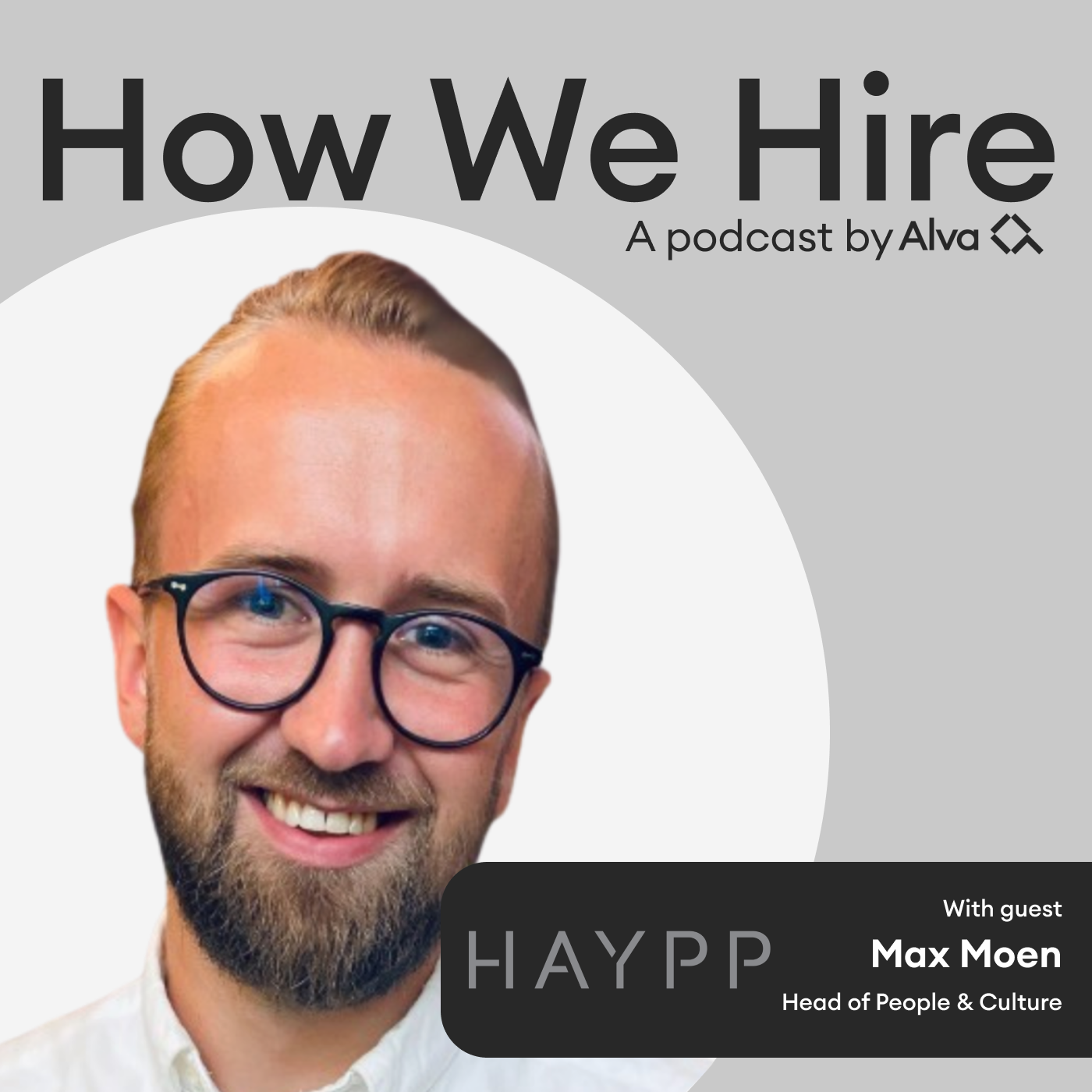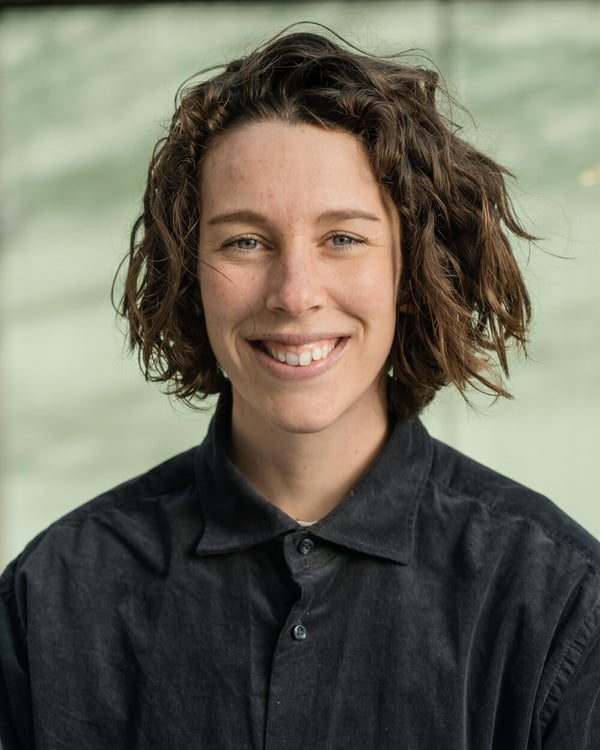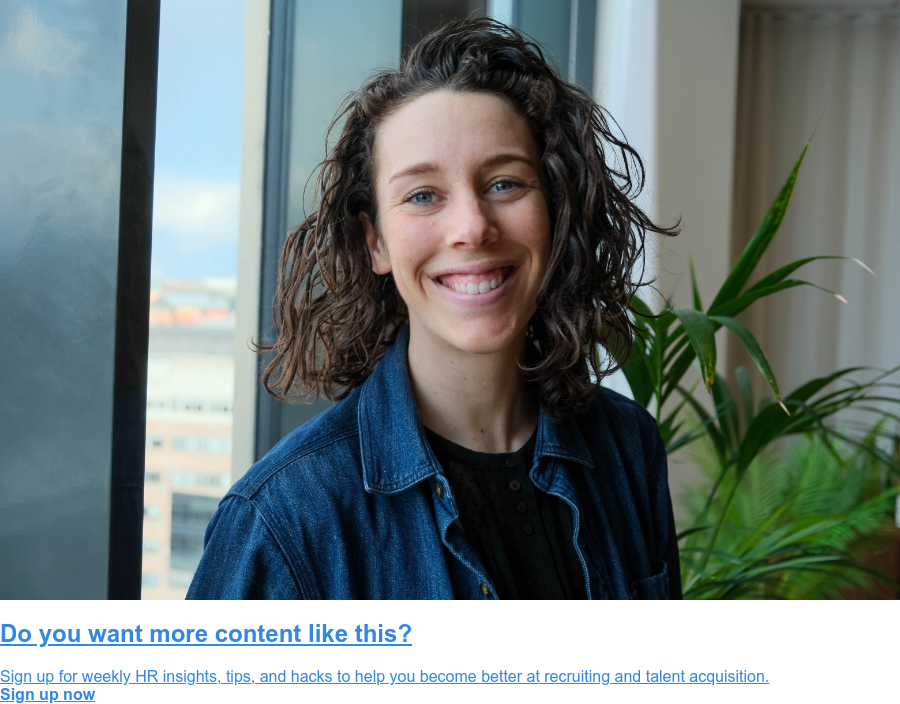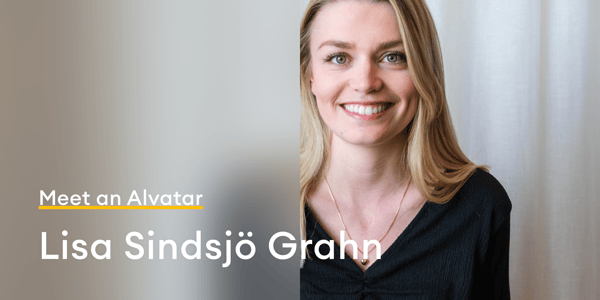How We Hire: Episode two transcript
Host (00:06): Welcome to How We Hire, a podcast by Alva Labs, with [inaudible 00:00:11]. This show is for all of you who hire or just find recruitment interesting. Every episode, we will speak to thought leaders from across the globe to learn from their experiences and best practice within hiring, building teams and growing organizations. Hi, and welcome everyone to another episode of How We Hire with [inaudible 00:00:35], so happy to have Max [inaudible 00:00:39] here with us today. Max, do you want to introduce yourself?
Max (00:42): Yes. Thank you for having me. I currently work as head of people and culture at Haypp Group, which is a company working in the field of inspiring healthier enjoyment. We are selling nicotine pouches and Swedish style [inaudible 00:00:56] online through multiple eCommerce store brands, and so a very digital company. I started here as a recruiter, or responsible for recruitment and [inaudible 00:01:06] acquisition at Hype Group. Then prior to that, I was working a long time at Viaplay with both tech recruitment, but also recruitment from a broader perspective. Prior to that, I was working as a recruitment consultant.
Host (01:19): Starting right off the bat, how has that transition been for you? It's a really fun journey.
Max (01:24): To be honest, I don't know how inviting I should be to this unsafe part of myself, but half the time, I don't really know what I'm doing. I mean, I think it's also when we leave our comfort zone, to where we actually learn and grow. I think it's a great opportunity for me to learn a lot, actually, and it's a perfect place to be at for that, because it's a lot of doer attitude. A lot of, "Let's try it out," a lot of change orientation and so on, so when I've been coming up with suggestions, it's been like, "Yeah, cool. Let's go with that."
Host (01:58): I think we can all relate to that feeling, or at least I can. Before we dive into the recruitment bits of this, because I do think this is a relevant topic, because I can really resonate, or it really resonates with me. I took this role not having like that much experience within HR before, so how do you tackle those feelings of, this is super scary? How do you survive?
Max (02:24): Yeah, the imposter syndrome, basically. The thing here is actually that I've gotten some space to actually read up on some things, and so on. I've been super obvious with my manager that recruitment is where I'm strong, and these spaces are, I know of them on a theoretical level, but I have no practical experience from it. He knows this, so I've gotten the chance to read up on a lot of things, but then also I'm lucky enough to have good friends like yourself, [inaudible 00:02:50], who can tell me how to do my job. I'm networking a lot as well.
Host (02:52): One with imposter syndrome is teaching another with imposter syndrome how to do things.
Max (02:55): Exactly, the blind leading the blind.
Host (03:01): Yes, big time, but I like the fact that taking the time to actually read up on things and networking is something that actually helps.
Max (03:07): It really does. I wouldn't have been able to do this if I hadn't, so it really, really works. That's the good thing when it comes to building culture, which has been one of my projects, working with values and so on. There's a lot of smart people that has done this before me, and I think no matter how highly I think of myself, there's definitely going to be a smarter person who has solved this better in the past than I have. I mean, still with pride, that's how I get by.
Host (03:33): It's a relieving feeling, that the self [inaudible 00:03:36]. I think we could start from the beginning. You started working as an external recruitment consultant. How does one succeed in that, in that part?
Max (03:47): Well, I usually say that the best attribute you can have as a successful recruiter is to be able to be a pain in the ass, but do it with some elegance, so that was the first thing I needed to practice because I think I was a bit humble and careful in the beginning, but I started out at a tech headhunting company where it's chasing down people who don't want you to reach out to them.
There's a lot of, I wouldn't say hostility, but it's not always happy people who answer on the other side of the phone, so you really need to be able to think that ... You need to train this aspect of yourself with not getting broken down after getting 10 reactions in a row, because sooner or later, you're going to talk to someone who says that they want to talk to you. That takes a lot of mental exercise, and just put yourself out there, and yeah, cope with it, basically.
Max (04:39): That was the hardest part, but then comes the next parts of, okay, how am I, who is trained in HR and people, to learn about tech and how to program and so on, and how am I to be an expert in that? That's a huge leap, so there, also a lot of reading, but also a lot of, once again, smart people who knew a lot of stuff that could teach me, and then also talking a lot to the candidates that I was interviewing and really showing interest, like, "Oh, cool. How does that work?" Usually, I think it's quite common though, that developers who are talking to someone who is not a developer, it's kind of rare that they meet an engaged party on the other side when it comes to, yeah. "Okay, but tell me, how does database modeling really work? How do you build these things?" Then, so usually people tend to be quite sharing in those places. That's how I learned the field.
Host (05:33): I think that's an interesting topic, of, at least my view is that there's two different types of recruitment consultants. Either you come from the industry and have no training in HR, or you come from the HR perspective and have no training in the field. How does one bridge the gap?
Max (05:51): It's hard, and it's extra hard when only working with other people schooled in HR as well, because the customers expect you to know your stuff in terms of tech and so on. You need to be able to dig deeper in what they actually know and so on and say, be able to say they know enough or not.
That's super abstract. No matter how much I train in this, it's still going to be abstract to me, while now, as a comparison, when I work in-house, I can say, "It seems like they know their stuff, let's meet the tech team," to check if they actually know their stuff. I mean, that was also kind of what happened when you were working as a consultant, but you needed to really say that they know their stuff. We've really had a deep interview here to check these things.
Host (06:38): You mentioned one thing here that I think stands out to some extent for the consulting role, with the stakeholder management of the client or the hiring manager. How does one successfully navigate that relationship?
Max (06:53): If I just step back a bit, when I started, I had been working extra, for a year or something like that. I was kind of new to the recruitment industry, and I was definitely new to the tech industry, but then I was hired as a recruitment consultant, and I mean, everyone internally knew that I was kind of junior, but from a client's perspective, you were always to pose as a senior. It was kind of big shoes to fill. It was like putting on a blazer and nice shoes, and then all of a sudden, yeah, I have a senior approach to what I'm doing. That was kind of scary and hard, but at the same time, I think for me personally, I got triggered by that challenge that I need to learn this.
Then I really, really focused a lot on seeing the person behind the actual role itself, and the actual role of being a customer, and really tried to bond with people that way and learned to be a bit more personal and so on. They started liking me, because then all of a sudden, basic psychology, then all of a sudden you're an in-group rather than an out-group person, and then they can probably oversee your shortcomings to some extent. I tried to sell my personality rather than my skills, because my skills was nonexisting, but not too much [inaudible 00:08:05]. Yes.
Host (08:07): A little bit of a fake it 'til you make it goes a long way.
Max (08:09): Yeah. Exactly. Yeah. Story in my life, here.
Host (08:14): Don't know. Okay, but then three years in, you probably had some skills. What would you say, what was your biggest learnings from those years that you took with you when you went to the inside?
Max (08:23): The thing I've been most happy about that I got from the consultancy gig was this attribute of being able to really, really push for getting your agenda through, basically, and not being too afraid of people thinking that you're kind of a pain in the ass, because I feel proud and not a bit insecure when I feel that the manager is thinking, "Oh, can he leave me alone?" I'm like, "Yeah, but this is how it's going to be if you don't answer my texts or whatever." I think that aspect really, really is needed if you are to make things happen, because that is what recruitment is all about. You need to push people into making decisions and so on, because recruitment is hard. If you have no one there pushing you, you're probably going to push the decisions for as long as you can, but with a recruiter that can be somewhat of a pain in the ass and push you to either yes or no, that makes it come forward. That aspect, I'm most happy about, that I brought with me. Of course, the knowledge and so on as well, but I think the knowledge I could have learned when I started at my new place, but this ability is probably what has helped me most, I think.
Host (09:27): If I could, translating that then to your internal role, was how to handle and make sure that the hiring manager that you worked with actually committed to decisions, got back to you with decisions. Should we move forward or not, and so forth?
Max (09:40): Yeah, exactly, because I came into a tech organization that was kind of big, 300 people, something like that. We were growing. Things were going extremely well. We had a lot to do. I think I had, at one point, I had 35 ongoing recruitments by myself. I had a lot to do during this time, and then I felt like, "Okay, this cannot fall on managers not getting back to me because they have too much to do. They need to understand that this is a priority and so on." Yeah.
That ability was needed, and it's usually what I'm looking for the most when I'm hiring recruiters, as well. To have the ability to scale this skill, basically, in being able to push things through. That's much more important than knowing your tech skills, for example, because that can be learned.
Host (10:23): I think that's fascinating. When we do hiring an Alva, we tend to calculate that you can probably have, depending on what type of role it is and where in the process you're at, you can have four to eight ongoing recruitments per recruiter. You had 35. Tell us your secrets.
Max (10:40): For a while, antidepressants, to be honest. No, but it was too much, and that's where I learned instead, okay, but as long as you don't say no, everyone is going to think that it still works out. We coped with that for a year, or something like that. Then I said, "Something needs to change," and then we started building a team, basically. That was a great learning for me as well. It's easy to say you need to set up for yourself and say to your managers and everything that, "I need this, I need this," and so on, but that was when I really understood, I actually need to do it because otherwise it's going to continue like this. Then as soon as I raised it, I got a lot of support, so no one did anything wrong at that place. It was me who didn't communicate [inaudible 00:11:20].
Host (11:21):Super important learning. I guess you still had to learn how to cut corners. What corners did you learn to cut that still created good results and saved you time?
Max (11:31): When you have 35 roles going at the same time, obviously you cannot give the same kind of support as you usually do to a manager, for example. I mean, I outsourced some of the actual candidate contact to the managers, and so on, so I started sharing some of my tasks to them. Then I realized after a while that they're not as good at it as I am. I mean, I wanted that control, or at least that my function has that control, and so that was one part.
Then also I worked a lot with the templates. I couldn't be as personal anymore with the candidates, so it was like, when we reacted to someone, I had one template for a reaction of the interview one, and one reaction of the phone call, and so on. A lot with templates and making things a bit more robotic, and pushing out responsibility. Then after a while you feel, okay, this is only quantity, no quality in this.
Then it wasn't that fun, so I'm thinking at Alva, your recruiters can probably provide a lot of quality and a lot of manager support throughout the process, and that's the ideal setup, obviously. I would definitely say that as a recruiter, you can probably cope with up to 10 roles for a limited period of time, but you need down periods after that, because then it's high pressure.
Host (12:44): I think one thing that we have tried to live by is that a hiring manager should never meet the candidate that could not be a great candidate's. They should do like the lucky, happy-go-lucky picking of who is most suitable for this specific role, and go deep in like the skills, because we have already established that they're a great person.
Max (13:06): That's definitely a philosophy that I share. I mean, that's the kind of service I want to give the managers, that they are only meeting candidates that could actually end up getting hired. That much, I think I should be able to give. Then, back at my former job, for a while there I let go of the candidate experience. I couldn't control it anymore, and that was also one thing that I could really use as an argument, "Okay, we'll make this work, but look at the candidate experience. We cannot say anything about it."
As we needed to maintain good contact, so it was a no-brainer that we should increase the team, but yeah, you can definitely cut corners, but it's always on the expense of someone's experience, either the managers or the candidates, and then of course the recruiters as well.
Host (13:52): Then you had a proper team, so you were more people sharing those 35 plus recruitments. How did that change? How did you change the candidate experience, for instance?
Max (14:03): Taking ownership of all the contact with the candidates, for example, and setting up ... We set up standards for, okay, when can you expect to get personal feedback, basically, and so on? Could it be more generic, and so on? I mean, we said that, has there been any kind of interaction face to face or at least by phone? You deserve some kind of feedback to why you didn't proceed. It's kind of interesting, because there's a lot of split opinions there on how you convey the message. What is the best way? If you are to reject a candidate that has gone far in the process, do you call them or do you send them mail, or what do you do? I mean, most people would probably say, yeah, but you call, that's more personal. Yes, but I can say personally, I would prefer getting a mail, I think. I would like-
Host (14:52): I know, me too.
Max (14:53): Yeah. I would like to react in peace, and then, because having someone calling you up, and you didn't get a job, and it's like, where you're supposed to be polite, and no, I'll probably ... I'll prefer to break down by myself for a bit.
Host (15:07): Exactly. We actually had a candidate reach out to us, because we do the majority of the rejections via email. As you said, the longer you've been in the process, the more personalized messages you will get, and if you've gone all the way, then you will probably get a phone call. I actually had a candidate that went pretty far in the process. They reached out, like, "Hey, fair. I understand, but I would have appreciated to get this as a phone call." I really, really think it's valid feedback. I base that on, as you said, myself, I would not want that phone call, but I think it's interesting of how different candidates are, and how can you accommodate for everything? You will probably exclude some of them.
Max (15:46): Exactly. I've actually gone kind of hybrid on that now. I start out with sending email, where I explain that we have decided to not proceed, and maybe if there's someone else we're proceeding with, then I'm explaining what they had, so that they can understand the difference from what they are not, but I don't say it explicitly, but I say that this candidate that we proceeded with has this and this and this. Then I say, "If you want more personal feedback, then I'm of course available for a phone call if you like." I've been picked up on that, I can probably count on my fingers how many times?
Host (16:17): Same here. We do a similar way. I think sometimes candidate reach out, and then it's probably super valid to take that conversation, because then if they have questions, I would be happy to answer them and give even more feedback. Sometimes people come back wanting more feedback, but still via mail, so I can still provide more information, but still not a phone call, but I think, yeah. Interesting.
Max (16:39): Yeah. It's interesting because the answer is going to differ depending on who you ask.
Host (16:43): Exactly. Yeah. Yeah, and I think that goes back to customization in the recruitment process in general, right? Candidates are always, in every step, going to prefer different methods of communication, how much communication. Some candidates are going to be irritated with reminder emails, or they're going to be, just keeping them warm type emails, but others really miss that, when that's not involved. It's always that balance.
Max (17:09): When you said that, I came to think of another thing, with the philosophy that I try to have, at least, and that is that it's always better to over-communicate. Even though you say to a candidate, "Yeah, we'll get back with an answer on Friday," and then you don't have an answer on Friday. I don't know what to do. Then you get back and say, "Hey, I'm getting back now, but we don't have an answer.
We'll get back as soon as we're ready." Me, I can always communicate because otherwise people are going to sit down and wonder what happened and so on. I think that could usually be the difference between a good and a bad recruitment experience. The message itself, what is said, is the same as the silence, but just that you're reaching out and saying it, this means something.
Host (17:48): Yeah. Yeah, I would actually rather be slower in my feedback loop and sticking to what I promise than over-promising and not delivering, because I think that's a worse message than someone would be like, "Hey, that's a long time," but then I could actually, could come back to that. Okay, so then you had this team, you could do different things, and especially improve the candidate experience, but I think since it was very, a lot of like tech recruitment, you would give some insights to ... That is beast of its own. Right?
Max (18:20): Yeah, yeah. It's a bit-
Host (18:22): What are your best tips to be successful in tech recruitment?
Max (18:27): As a recruiter, if you don't have a developer background, your sense, you should never try to be too good, because if you try to pretend that you're a tech expert, they can pick you apart with just a couple of questions.
I mean, never try to play that game. For me, it has always worked to be really interested, to generally be interested in how things work and link together, because you can get by as a tech recruiter with quite limited knowledge and so on. You can learn that, yeah, a front end engineer, they're good at Javascript and they usually know some HTML and CSS and so on, as well. Then you can stop there then. Then, I mean, for it to be fun, you almost need to invest bit in what it actually means, because otherwise it's just going to be strange words and so on.
Max (19:12): To be able to cope with the kind of tough landscape, I decided to raise an interest on my own. I've never written a single word of code, so it's not on that level, but just, I try to understand how everything is connected. I think it does a lot, because as mentioned earlier, you're going to face a lot of reaction and you're going to face a lot of tough recruitment processes where you are to take candidates through code tests, which they don't really want to do, and things like that. It's kind of tough from that perspective, so you really need to enjoy at least some parts of it, genuinely, I think.
Host (19:50): What are your thoughts and experiences on, meet the team and code together, and stuff like that, compared to smaller coding tests that take an hour? Do you have any preference?
Max (20:02): The biggest bottleneck we had at Viaplay when I was there was the code tests, and that was an ongoing discussion all the time, because it takes so much time, and first, it takes time from the candidate, and then they're supposed to write some code for ... I don't know, I've seen everything from between one hour to 20 hours, what is expected, and then, that's what you're going to do in your free time. Then the team needs to check it, and then probably one person is going to check it and they want the second opinion, so one more is going to check it and so on, so it's so much time in it. Then, if it's poor documentation, then they don't really know how the candidate thought, and that, from what I've learned, is the most important thing. I mean, you can write messy code if you can explain why you wrote the code messy, for example. Like, "Well, I thought it was just a short sample where I'm to show that I can solve this task," or, but these things you don't get from just some code.
Max (20:55): I mean, there's been so many strange situations with these code tests when people feel unfairly treated and so on. I think, if you're able to have a live coding session or some kind of live case, meet and pick some tickets together and try to solve a problem together, I think that's so much better in general. Then, if you ask developers, then this is going to be just as with the feedback, because some are going to prefer the code test where they can take home in calm and peace and just write their things and so on, and come back and confidently explain, while some people are super confident in themselves and can draw things on a whiteboard and be super confident and say, "Hey, this is how it works. I understand this." You're going to get mixed feedback there as well.
Host (21:39): Yeah. Yeah, definitely. I think, speaking from our experiences, we used to do an at-home assignment that took somewhere between three to four hours. We, I think, started seeing some pushback on that a couple of months ago. A year ago, that was not a problem. A couple of months ago, that was like, "Yeah, I don't want to do this," so we actually switched to a setup where they do an hour at home and then one hour peer programming with the team. We believe that has been perceived better by the candidates and better by the team, because it's less review and as you said, you get those train of thoughts and when you actually do the peer programming, and yeah. That's how we have approached it now, and I think it's, for now, working pretty well.
Max (22:26): From a recruiter perspective, you definitely prefer a live session rather than code tests, because it's taking so much time and it's investing so much. I really think everyone that has these long code tests should try to reconsider if that is the way to go, really, with the candidate market as it is, where everyone is looking for developers.
Host (22:47):Yeah. For sure. How did you manage to stand out and actually attract talent in that scarce market?
Max (22:56): I mean, we had a quite cool brand to start with. I mean, most people knew, in Sweden at least, knew what it was. I mean, we could still rely on LinkedIn to reach through the buffer, basically. I mean, we could send emails and we would still get replies. Not a lot of them, but we still got replies. Then, how we composed our emails, we were really, really straight to the point. "This is what it's about," and we were quite good in sourcing as well, so it was really uncommon that we targeted the wrong candidates, I would say, because it is quite common that people, or some recruitment agencies in particular are just mass sending out emails, that ends up completely wrong. I think having kind of a cool brand and then at the same time being really accurate in research is ...
Max (23:45): It was enough for us, but then we still had some challenges. We knew that there were some companies that were still slightly cooler than what we were, and that can also pay ... Could. I'm not going to say can, but could back then, pay slightly more. Some were, it felt like, economically independent. I don't know [inaudible 00:24:05] that they did, but some companies could do that. We understood that we needed to have another edge, and that was that we were super fast, so we could ... Apart from the code tests, the actual process with us could mean meeting two times and then have an offer on the table. Yeah, and we skipped references and we skipped entering the process as much as we could to be super quick, so we could extend an offer far earlier than the other companies. That was our edge, I think.
Host (24:36): Then we went through kind of, as a consultant and then in-house, and building out your team in tech, and now you are in a smaller team again.
Max (24:44): Yeah, exactly. Actually, you started there. During the time that our team was merged into the whole [inaudible 00:24:52] entertainment group, so we were all of a sudden part of the HR team instead. Then we started working as one recruitment team as well.
When that merge happened, I was still focusing on tech recruitment, but then our manager quit so I took some extra responsibility in leading the team from an operational side of things. Then I started working with all kinds of roles, so there is where it started, where I started working with more than just tech, and at a company with that strong of a brand, I was kind of surprised in, "Oh, okay. You can actually get candidates that apply. That's that's news to me."
Host (25:25): It's brand new information.
Max (25:28): Yeah, exactly. Then I realized that I was kind of poor in managing a larger process, because as soon as I saw a good resume, I was like, "Oh, we need to meet this candidate, we need to go for closure," and so on. Then, just give it a couple of days and you're going to have a couple more. That was the mindset all of a sudden, so I pushed in some places where I shouldn't have pushed that early, to be honest.
Host (25:52): Interesting.
Max (25:52): Yeah, but that was for some roles, and in some roles outside of tech it's still super challenging as well. Of course, [inaudible 00:25:58], yeah, but there are definitely some roles that I was like, "Wow, we have a good candidate, we need to go for it."
Host (26:04):Then the hiring manager was like, "Yeah, but I want to pick and choose."
Max (26:09): Yeah, exactly. "I want to choose in between five." "That's not how it works."
Host (26:16): Drama. I have to ask, because I do the same thing now, but how do you lead a team of recruiters?
Max (26:21): That's a good question, but I cannot really answer how, more than to be there constantly to bounce off ideas, I think. It's like, it's a craftsmanship that to some extent is a skill, but then also depends completely on how other people make decisions. As we discussed earlier, it's depending on the person, right? You still need to have this opportunity to bounce off ideas, and I think a lot of recruiters that I've been working with at least, has the need of hearing themselves resonate. Like, "How should I think here?" Usually don't need to have the answer, but you need to be there quite often to, "Okay, now I'm in this special situation instead and the candidate said this," and so on. I didn't always have the answer, but just to be there, to be able to bounce, I think was quite important.
Host (27:02): Very good point. I think you and me have actually talked about this before, but getting that overview of, what processes do we have ongoing, and where? Can we take on more and just have that workload visibility? It's so difficult because it's so different in the different stages of each process. It's not enough to just say, "Okay, I have eight processes, I have 15, I have two." It could be the person that has two processes has the highest workload.
Max (27:30): Yeah, and we actually tried there to ... We did our own. We fell back to Excel, of course, and we did our own sheets, with the ongoing processes that we had. It was like, given that we were working with some business roles that had a lot of applicants and so on, and so we tried to make a color scheme as the driving lights, basically, from green to yellow to red, and then we could rate it from ourselves, like. "How much time do I need to invest in this process as of now?" You could only have a couple of red roles, basically.
Host (28:00): Oh, nice.
Max (28:01): Yeah, if you had two final candidates that we only have reference checks left, well then that role is probably green. Then it's like, then it's on its way out, so we can start considering new roles here. Most roles should probably be yellow most of the time, but if we lost all our candidates and we really need to restart and so on, well then, this role is red because we don't have any applications either. We tried to work with it like that. It sounds good in theory, but it was very different in how we used these colors. Yeah, but that is how we tried to do it because we realized that we couldn't really, really quantify this workload, given that it's so different between different roles. Now, I am in a much smaller team. Yes, so it was a, sorry, but now I need-
Host (28:52): Good sidetrack.
Max (28:53): Yeah, but now I'm in a much smaller team. We are an HR or people and culture team of two people here. We just signed a third person who is joining us after the summer, but we're two people and we are now doing a bit of everything, both of us. I'm focusing more on recruitment and my colleague is focusing more on payroll and all of the HR data and admin and so on, so these are base areas basically, but then we have all different projects in the middle of us, which is everything from performance reviews to engagement, to learning and development, to everything within that. There, we're picking from together, as of now.
Host (29:40): Nice.
Max (29:41): Yeah, but I was hired here as a recruiter to build a recruitment function, because we had quite high goals on growth. Then, two weeks after I joined, the HR director who hired me quit. Hopefully not correlated, I hope.
Host (29:59): Fingers crossed.
Max (30:00): Yeah, fingers crossed, but then she quit, so from the start I started picking up a lot of work tests. Now, since a couple of weeks back, we made it official that I'm taking the role full-time as head of people and culture.
Host (30:12): Looking then, because now, I mean, you are more ... You have the capability and opportunity to build how you want everything to work, so what do you foresee in the future? How will you change recruitment at Hype or people and culture at Hype?
Max (30:27): When I came in here, it was kind of the wild west, I would say. It was like, no, but every manager had their own trusted supplier they went to, and so on. To be honest, I mean, some people listening to this is probably going to get kind of mad with me for saying this, but there are a lot of recruitment consultants out there that care more about closing than it actually becomes the right hiring, in the very end. We had some cases with that, where we had some consultants that was always pushing for closing, closing, closing. I mean, I was like, "Okay, but are we even checking, or are we just hiring people?" I started building a process for how to evaluate candidates properly.
Now I'm not going to be able to be as hands- on myself, as before. I'm still going to recruit some, but we will look into hiring recruiters going forward. We can work with this, so we have a foundation in place now and managers are trained in interviews and stuff like that, and know how to have the process, basically. The foundation is set, but we still have a lot of recruitment to do.
Host (31:31): Cool, so now it's time to build out the team and execute on the plan that you have kind of set.
Max (31:37): Yeah, exactly, so that's the plan, and we just hired a person coming directly from school, as of now, but has a super cool background within both teaching and HR. It's kind of a cool mix. She's joining us soon, and then, yeah. We haven't started looking for a recruiter yet, but that will happen soon. Then let's see how much we end up with. Yeah. That's the plan.
Host (32:00): Sounds like a great plan.
Max (32:01): Yeah. Interesting stuff.
Host (32:06): Thank you so much, Max, for joining us and sharing your experiences with us today, and yeah. Thank you everyone for listening, and we hope you've joined us for the next episode of How We Hire.







